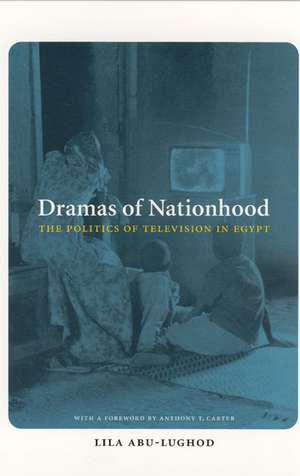Dramas of Nationhood: The Politics of Television in Egypt: Lewis Henry Morgan Lecture Series
Autor Lila Abu-Lughoden Limba Engleză Paperback – 18 noi 2004
How do people come to think of themselves as part of a nation? Dramas of Nationhood identifies a fantastic cultural form that binds together the Egyptian nation—television serials. These melodramatic programs—like soap operas but more closely tied to political and social issues than their Western counterparts—have been shown on television in Egypt for more than thirty years. In this book, Lila Abu-Lughod examines the shifting politics of these serials and the way their contents both reflect and seek to direct the changing course of Islam, gender relations, and everyday life in this Middle Eastern nation.
Representing a decade's worth of research, Dramas of Nationhood makes a case for the importance of studying television to answer larger questions about culture, power, and modern self-fashionings. Abu-Lughod explores the elements of developmentalist ideology and the visions of national progress that once dominated Egyptian television—now experiencing a crisis. She discusses the broadcasts in rich detail, from the generic emotional qualities of TV serials and the depictions of authentic national culture, to the debates inflamed by their deliberate strategies for combating religious extremism.
Representing a decade's worth of research, Dramas of Nationhood makes a case for the importance of studying television to answer larger questions about culture, power, and modern self-fashionings. Abu-Lughod explores the elements of developmentalist ideology and the visions of national progress that once dominated Egyptian television—now experiencing a crisis. She discusses the broadcasts in rich detail, from the generic emotional qualities of TV serials and the depictions of authentic national culture, to the debates inflamed by their deliberate strategies for combating religious extremism.
Preț: 294.80 lei
Nou
Puncte Express: 442
Preț estimativ în valută:
56.42€ • 58.28$ • 46.95£
56.42€ • 58.28$ • 46.95£
Carte tipărită la comandă
Livrare economică 26 martie-09 aprilie
Preluare comenzi: 021 569.72.76
Specificații
ISBN-13: 9780226001975
ISBN-10: 0226001970
Pagini: 324
Ilustrații: 16 halftones
Dimensiuni: 152 x 229 x 28 mm
Greutate: 0.51 kg
Ediția:1
Editura: University of Chicago Press
Colecția University of Chicago Press
Seria Lewis Henry Morgan Lecture Series
ISBN-10: 0226001970
Pagini: 324
Ilustrații: 16 halftones
Dimensiuni: 152 x 229 x 28 mm
Greutate: 0.51 kg
Ediția:1
Editura: University of Chicago Press
Colecția University of Chicago Press
Seria Lewis Henry Morgan Lecture Series
Notă biografică
Lila Abu-Lughod is professor of anthropology and women’s studies at Columbia University. She is the author of Veiled Sentiments and Writing Women’s Worlds, editor of Remaking Women: Feminism and Modernity in the Middle East, and coeditor of Media Worlds.
Cuprins
Foreword
Acknowledgments
PART ONE Anthropology and National Media
1. Ethnography of a Nation
2. Interpreting Culture(s) after Television: On Method
PART TWO National Pedagogy
3. Rural "Ignorance" and the Virtues of Education
4. Development Realism, "Real Melodrama," and the Problem of Feminism
PART THREE The Eroding Hegemony of Developmentalism
5. Modern Subjects? Egyptian Melodrama and Postcolonial Difference
6. The Ambivalence of Authenticity: National Culture in a Global World
7. Managing Religion in the Name of National Community
8. Consumption and the Eroding Hegemony of Developmentalism
Conclusion: Star Magic and the Forms of National Affinity
Appendix
Notes
References
Index
Acknowledgments
PART ONE Anthropology and National Media
1. Ethnography of a Nation
2. Interpreting Culture(s) after Television: On Method
PART TWO National Pedagogy
3. Rural "Ignorance" and the Virtues of Education
4. Development Realism, "Real Melodrama," and the Problem of Feminism
PART THREE The Eroding Hegemony of Developmentalism
5. Modern Subjects? Egyptian Melodrama and Postcolonial Difference
6. The Ambivalence of Authenticity: National Culture in a Global World
7. Managing Religion in the Name of National Community
8. Consumption and the Eroding Hegemony of Developmentalism
Conclusion: Star Magic and the Forms of National Affinity
Appendix
Notes
References
Index








